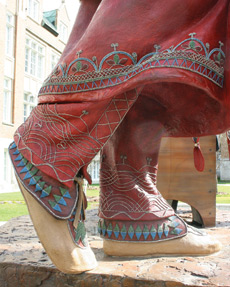First Peoples Studies courses available

An official major in the First Peoples Studies won’t likely be launched until next year, but new professor Louellyn White is getting the program off to a successful start.
White joined the School of Community and Public Affairs in September and is already teaching the Introduction to First Peoples Studies course before the program is granted official status by the provincial government in fall 2011. Students will be able to transfer their credits when the program is recognized next year.
“Coming from the states, Montreal feels foreign,” White says. At the same time, this is the region my ancestors are from. To teach a class with Mohawk students, with Kahnawake just across the river…wow. There’s a sense of a shared history, shared understanding. To me, it’s like coming home.” An official major in the First Peoples Studies won’t likely be launched until next year, but new professor Louellyn White is getting the program off to a successful start.
Growing up, she didn’t initially embrace her heritage. Her mother was European and her father was Mohawk. She was raised in her mother’s home in the Mohawk Valley in New York, speaking only English. Her family lost the tradition of speaking the Mohawk language after her grandfather was interned at the Carlisle Indian Industrial School in Pennsylvania. She has since taken an immersion program to learn Kanien’kéha.
“Many scholars say language equals culture,” she says, recounting a confrontation between her 80-year-old father and elders on the reservation. “What kind of a Mohawk are you if you don’t speak the language?” they asked him. It was upsetting to have his identity challenged.
White’s own research project is focused on the Akwesasne Freedom School, a community-based Mohawk language and cultural immersion school on the Saint Lawrence river, opposite Cornwall. She has been documenting the history of the 25-year-old school and its impact on the community. Her findings will be published in a forthcoming book published by the University of Oklahoma Press.
In her research, she prefers to say that language is one aspect of culture, since some people may be fluent but don’t know their full history or might be out of touch with traditions.

Prior to coming to Concordia, White lived and worked across the U.S.: she taught environmental education in Pennsylvania; she developed a statewide leadership training program in New Mexico; and she helped coordinate a research project for two reservation communities in Colorado. She completed her PhD in American Indian Studies at the University of Arizona and was then awarded a postdoctoral fellowship at the University of Illinois at Champaign-Urbana.
With a wealth of life experience to call upon, White likes to combine lectures with discussion and activities in her own classes – she’s not a fan of standing in the front and simply conveying information. The introductory class was assigned to write about their values and beliefs for their first paper, which was not easy for many of them to express in words.
“To be able to understand another group’s values and beliefs systems, it’s helpful to understand your own,” she explains.
Related Links:
• Major in First Peoples’ Studies
• School of Community and Public Affairs
• Akwesasne Freedom School